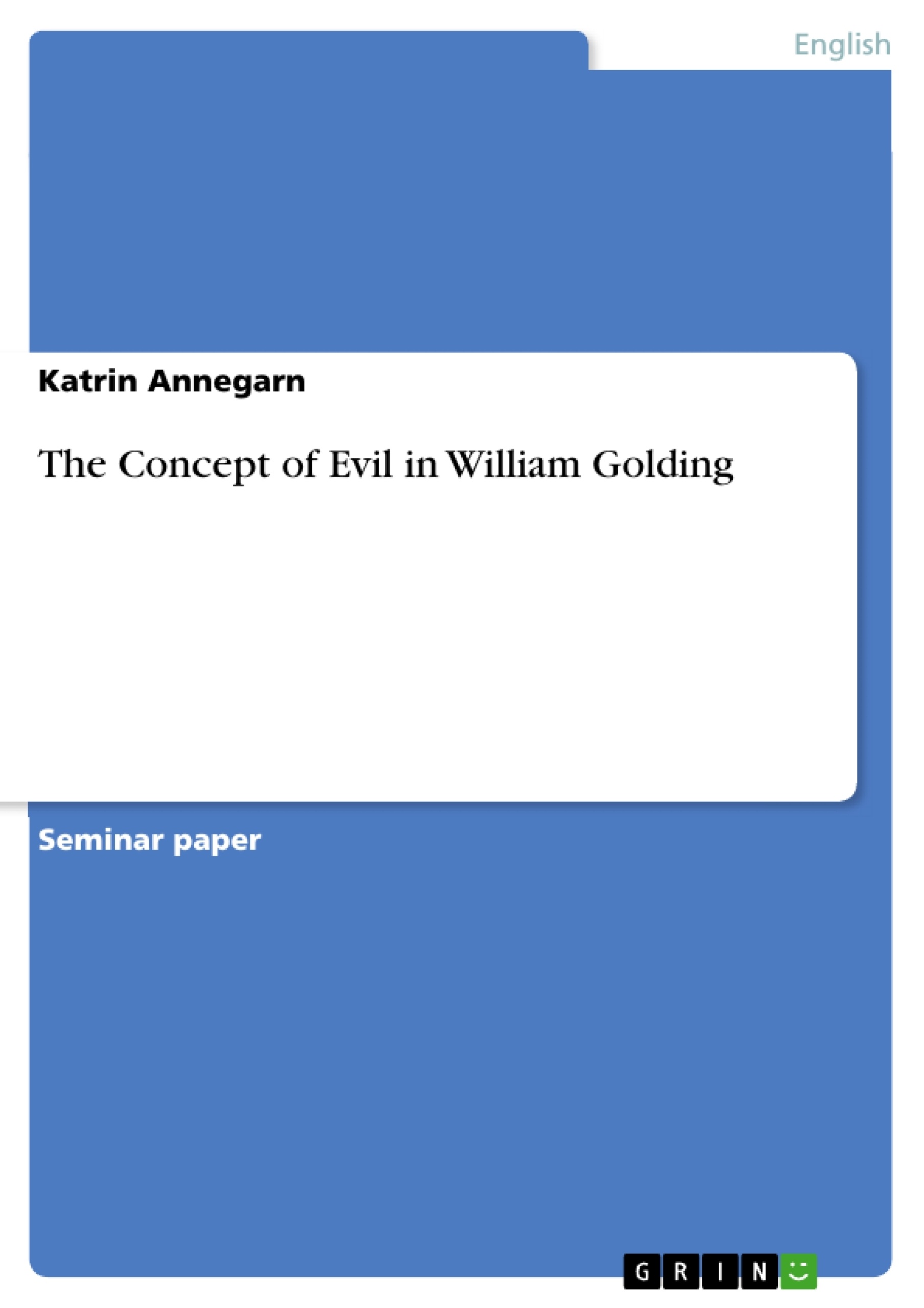As the motif of evil is the central theme in William Golding’s work, I will consider in my term paper his definition of evil and its realization in his first two novelsLord of the Flies(1954) andThe Inheritors(1955). How did he under-stand this complex but central motif of human life and religion? Is there a general position towards evil that can be recognized in his work? Did he consider human beings as generally evil or generally good? - Thinking about the idea of “evil”, many questions arise. Trying to answer some of them, I will concentrate mainly on the book we talk about in class,The Inheritors,his second and - as he himself said - favourite novel.
In summary,The Inheritorsdeals with evolution and the development of human beings. On the example of a Neanderthal group, Golding depicts the conflict between the Neanderthalers and the “New Men”2,homo sapiens,which finally ends in the death of the Neanderthalers and the victory of the superiorhomo sapiens.But arehomo sapiensreally superior to the Neanderthalers? What is Golding’s position?
In a further step, I will examine Golding’s first and most famous novel,Lord of the Flies(1954), for the idea of evil. Is the attitude he gives inThe In-heritorsthe same as inLord of the Flies?Or did his view change after the first novel?
As a summary, I would like to give a final conclusion of Golding’s un-derstanding of his central motif “evil” and consider perspectives for further examinations.
Inhaltsverzeichnis (Table of Contents)
- Introduction
- Definition of "Evil"
- Common definition
- Golding's definition
- The Concept of Evil in The Inheritors
- Summary: The plot of The Inheritors
- Characteristics of Golding's Neanderthalers
- Homo sapiens' characteristics
- An interpretation
- Evil in Lord of the Flies
- Summary: The plot of Lord of the Flies
- Evil in Lord of the Flies
- Conclusion and perspectives
Zielsetzung und Themenschwerpunkte (Objectives and Key Themes)
This term paper investigates William Golding's definition of evil and its manifestation in his first two novels, Lord of the Flies (1954) and The Inheritors (1955). The paper explores how Golding understood this complex theme in human life and religion, examining whether his work presents a consistent view on the nature of evil and whether he considers humans innately good or evil. The paper focuses primarily on The Inheritors, Golding's second novel, which he considered his favorite.
- Golding's understanding of evil
- The nature of evil in Lord of the Flies
- The nature of evil in The Inheritors
- The role of evolution in the development of evil
- The influence of societal factors on human behavior
Zusammenfassung der Kapitel (Chapter Summaries)
The first chapter examines different definitions of "evil," drawing on dictionaries and theological perspectives. It explores the concept of human freedom and its potential for both good and evil. The chapter concludes by questioning whether Golding believed in a devil and how his work reflects his understanding of "theodicy."
The second chapter presents Golding's personal view on evil, exploring how his experiences during World War II shaped his understanding of human nature. The chapter contrasts Golding's pre-war belief in society's ability to protect individuals from their innate malice with his post-war disillusionment.
The third chapter delves into the concept of evil in The Inheritors. It summarizes the novel's plot, focusing on the conflict between the Neanderthalers and Homo sapiens. The chapter analyzes the characteristics of both groups, highlighting Golding's depiction of their respective strengths and weaknesses.
The fourth chapter examines evil in Lord of the Flies. It summarizes the novel's plot and analyzes the emergence of evil among the stranded schoolboys. This chapter explores how Golding portrays the destructive potential of human nature and the role of societal structures in influencing behavior.
Schlüsselwörter (Keywords)
The core themes and concepts explored in this term paper include: evil, human nature, Lord of the Flies, The Inheritors, William Golding, evolution, Neanderthalers, Homo sapiens, freedom, responsibility, theodicy, and society's influence on behavior.
- Arbeit zitieren
- Katrin Annegarn (Autor:in), 2005, The Concept of Evil in William Golding, München, GRIN Verlag, https://www.hausarbeiten.de/document/67445


